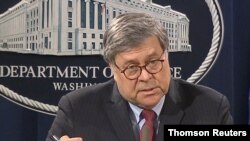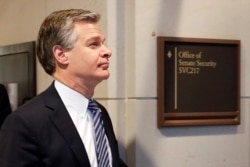U.S. adversaries are starting to weaponize protests that have gripped parts of the country “to sow divisiveness and discord,” according to top law enforcement officials who refused to share additional details.
The protests over the killing of George Floyd, an African American man who died in police custody after a white police officer held him down and pressed a knee against his neck, have caught the world’s attention, getting considerable media coverage in Russia, China and Iran.
But the U.S. Justice Department and the FBI now allege that unnamed countries are going a step further, actively manipulating information to make the situation in the United States worse.
“I believe that we have evidence that some of the foreign hackers and groups that are associated with foreign governments are focusing in on this particular situation we have here and trying to exacerbate it in every way they can,” U.S. Attorney General William Barr said Thursday during a news conference about the protests.
Barr further accused the foreign actors of “playing all sides to exacerbate the violence.”
FBI Director Christopher Wray declined to share additional information, though he cautioned that anyone running disinformation campaigns or influence operations to hurt the U.S. would not escape unscathed.
“Those foreign actors should know that we're watching it extremely closely and are prepared to act if necessary," he said.
Few traces of sophisticated operation
U.S. intelligence officials have been bracing for some sort of influence operation, warning last week that it was likely just a matter of time before the country’s adversaries attempted to exploit the anger and mistrust that has been fueling both the protests and some of the response.
NEW: US intelligence officials are on the lookout for foreign actors to use the growing #GeorgeFloyd protests to target the country
— Jeff Seldin (@jseldin) May 30, 2020
"We certainly anticipate that our adversaries may attempt to exploit this situation for their own ends” per an @ODNIgov official
But independent analysts and experts contacted by VOA questioned the government’s claims, saying that while it was not impossible that some state-linked groups had refined their tactics and were running sophisticated influence operations, there were few traces, if any, online.
“We haven’t seen any open source evidence that there is sustained, covert online information operations targeting activism and protests in the United States,” Graham Brookie, director of the Washington-based Atlantic Council’s Digital Forensic Research Lab, told VOA.
“The majority of messaging we’re seeing from Russia, China, Iran, Venezuela and others about the current protests in the United States is directed at domestic audiences in those countries,” Brookie added, though he cautioned a lack of evidence, at this point, of targeted influence operations was not necessarily surprising.
“Compared to newsrooms, it typically takes more time for agents of foreign influence operations to adjust to breaking news events,” he said.
The Justice Department did not respond to VOA’s requests for additional information, and the FBI declined to comment.
Seizing an opportunity
Unless new evidence emerges, researchers like those at the Digital Forensic Research Lab argue it would seem U.S. adversaries are content, for the moment, to focus their efforts on making sure Floyd's death and the protests keep trending on state-backed media websites and on social media.
According to an analysis by the Alliance for Securing Democracy, a Washington-based effort to document and expose “ongoing efforts to subvert democracy,” the hashtag #GeorgeFloyd was top among all Russian diplomatic and state-backed social media accounts from Friday to Sunday night.
“#GeorgeFloyd” was also the third most popular hashtag among Chinese diplomatic and state media accounts.
“We know that they are trying to take this opportunity to make comparisons to try to sow discord in the U.S.,” State Department spokesperson Morgan Ortagus told VOA on Thursday, when asked particularly about China’s efforts.
“We do know that we're seeing them retweet things like RT, the Russian propaganda outlet,” she added. “And, we have talked about how we've seen a convergence between China, Russia and Iran spreading each other's disinformation on Twitter, on Facebook, the internet.”
Global politics
Some analysts warn that not all of that is necessarily aimed at sowing divisions within the U.S. Some of the coverage and propaganda about the protests, they say, has more to do with global politics.
“It has provided the opportunity for the United States’ adversaries around the world — China, Russia, North Korea, Iran — to weigh in, and weigh in in an ideological way in which they talk about the weaknesses of the U.S. system, the liberal democratic order,” Ken Gause, the director of adversary analytics at CNA, a Washington-based think tank, told VOA’s Korean service.
“It gives them a chance to really kind of push back,” he said.
Other analysts also caution that most of what they have seen so far does not fall into the category of disinformation.
“Some of it is definitely provocative and controversial, but it is not misleading or manipulated,” the Alliance for Securing Democracy’s Bret Schafer told VOA.
And the disinformation ASD has seen, including a series of images circulated on Twitter this week purporting to show protesters in the U.S. asking for help from Beijing, do not appear to be part of any coordinated effort.
Been seeing some fake photos circulating that appear to show US protesters asking China for help. Not sure who photoshopped them or why, but be careful and reverse image search on TinEye or Google before sharing protest photos. pic.twitter.com/GqYSWf4JlE
— Shelley Zhang (@shelzhang) June 1, 2020
“To date, we’ve seen no evidence that this [the faked photos] has been orchestrated or amplified by state actors,” Schafer said.
Experts and officials also believe that much of the disinformation on social media right now is coming from U.S.-based groups and individuals.
🚨Beware of fake social media accounts, which have the potential to quickly spread disinformation to a widespread audience. These accounts have posted content in order to instill fear and panic during these times of civil unrest.🚨 pic.twitter.com/ijdHlbhWnK
— NJ Homeland Security (@NJOHSP) June 4, 2020
Attempts to further divide a nation
But experts note there is reason for concern, especially as adversaries like Russia and Iran have a history of seeking to exploit racial tensions in the U.S.
A 2019 report by the U.S. Senate Intelligence Committee found Russia’s best-known troll farm (people who post deliberately inflammatory or provocative comments), the St. Petersburg-based Internet Research Agency (IRA), heavily targeted African Americans in the run-up to the 2016 U.S. presidential election.
More from the Senate Intelligence Committee report on #Russia social media ops - Republican candidates perceived as hostile to Moscow also targeted, including @tedcruz and @marcorubio pic.twitter.com/x5YCiOxxk0
— Jeff Seldin (@jseldin) October 8, 2019
“No single group of Americans was targeted by IRA information operatives more than African Americans,” it said. “By far, race and related issues were the preferred target of the information warfare campaign designed to divide the country in 2016.”
In 2018, Facebook also took down dozens of accounts, pages and groups linked to Iran and seen as an effort to inflame racial divides ahead of the 2018 midterm elections.
VOA State Department Correspondent Nike Ching and VOA Korean service reporter Eunjung Cho contributed to this report.





